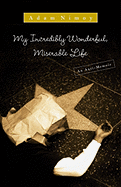

Nimoy realizes that a marijuana addiction isn't the stuff of James Frey-type legend (part of the problem with a pot habit, he says, is that it never allows the user to bottom out and therefore be forced to get help), but once he stops smoking cannabis, he recognizes that he has been using it--successfully--to escape from any kind of emotional discomfort. Some of this came from being in a marriage that hadn't been functional for many years and some came from an unfulfilling career as an attorney and a second, failed, career as a TV director. A much deeper pain came from his father, portrayed here (not unsympathetically) as a mostly absent, borderline alcoholic who had--at best--difficulty expressing affection. But Nimoy doesn't waste time wallowing in bitterness and blame. Once his new sobriety allows him to work out his problems with his father, he uses his new understanding to become a better parent to his own children, both of whom are traumatized when he moves out and divorces their mother. Those passages, where Nimoy describes his sometimes joyful, sometimes heartbreaking conversations with his children, are among the most touching in a book that has many poignant moments. Unpretentious and straightforward, Nimoy's memoir is a surprisingly affecting account of a man who learned to be a good father by understanding who he was as a son.--Debra Ginsberg

